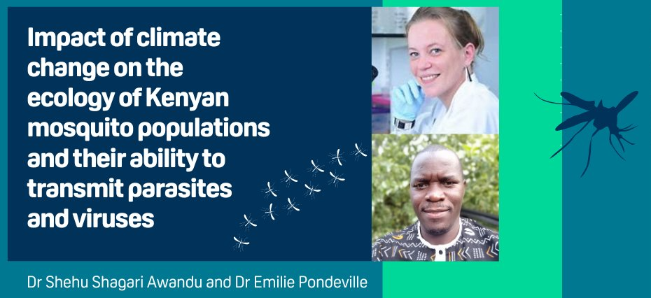Pondeville and Shagari receive £300k to investigate mosquito populations in Kenya.
Published: 1 October 2024
The MRC-University of Glasgow Centre for Virus Research's Dr Emilie Pondeville and co-Principal Investigator Dr Shehu Shagari Awandu have been awarded a Medical Research Funding grant of over £300,000 to investigate mosquito populations in Kenya.

MRC-University of Glasgow Centre for Virus Research's Dr Emilie Pondeville, together with co-Principal Investigator Dr Shehu Shagari Awandu from the Jaramogi Oginga Odinga University of Science & Techology, has been awarded a Medical Research Funding grant of over £300,000 to investigate mosquito populations in Kenya.
Specifically, the pair will utilise the funding to study the East African country’s Anopheles stephensi and Aedes aegyptim populations.
Among other impacts, climate change is raising temperatures and altering patterns of rainfall, which in turn is affecting how mosquito populations transmit diseases such as malaria, dengue, and chikungunya.
Rising temperatures in particular directly affect the ability of mosquitoes to carry and transmit pathogens, as well as impacting vegetation and therefore indirectly altering their ecology and food sources.
This poses a significant threat to public health and economies globally, especially in regions like sub-Saharan Africa, where malaria is already a major health concern.
The recent invasion of the Asian mosquito Anopheles stephensi in Africa has only exacerbated the situation. Furthermore, the lack of understanding about Aedes mosquitoes, which spread viral diseases, adds to the risk of future outbreaks occurring.
To address these challenges, Dr Pondeville and Dr Awandu aim to study the distribution, ecology, and disease transmission capabilities of both Anopheles and Aedes mosquitoes under changing environmental conditions.
The three-year project, one of six funded by the MRF, also hopes to raise awareness among school children of climate change and mosquito-borne viruses, through educational videos.
Ultimately, the team are working to improve understanding of vector-borne diseases in Kenya and to shape better public health strategies.
Dr Pondeville, a Senior Research Fellow at our MRC-UofG Centre for Virus Research (CVR), said: "I'm honoured to have received this MRF award in partnership with my collaborator Shehu Awandu.
"In this MRF-funded project, we will study both Anopheles and Aedes Kenyan mosquitoes under changing environmental conditions and examine how they transmit diseases, including malaria and the overlooked arboviral infections.
"Understanding vector-borne diseases will ultimately help to shape public health strategies to mitigate the growing burden of mosquito-borne diseases in the face of climate change."
First published: 1 October 2024
<< News

